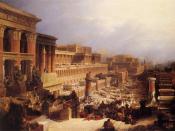The Significance and Symbolism of Pesach To the Jew, Pesach is not only one of the most sacred holidays; it is also one of the most symbolic and meaningful. The story of Pesach appears in Exodus, where the Jews were slaves under the rule of Ramses II. The Israelites were in bondage in Egypt and were forced to do slave labor building the large architectural structures in Egypt. The Israelites cried and prayed, and finally, "their cry for help from the bondage rose up to G-D. G-D heard their moaning, and G-D remembered His covenant with Abraham, Isaac, and Jacob. G-D looked upon the Israelites, and took notice of them." (Ex 2:23-25) G-D summons Moses to be the deliverer of the Israelites from the land of Egypt to the Promised Land. After repeated attempts of asking Pharaoh to "Let My people go that they may worship Me" (Ex 8:17) on behalf of the Lord, Ramses remained stubborn.
Moses then sent the 10 plagues on Egypt, and it took until the 10th and final plague, killing of the first-born son, to change Pharaoh's evil ways. On this night, the Israelites were instructed to place blood on the frames of their door so that the angel of death may "pass over" the homes of the Israelites, and only strike the Egyptians.
After this plague, Pharaoh releases his slaves. The Israelites did not have enough time to finish baking the bread, so it remained unleavened as they hurried out of Egypt. Moses led the Israelites out of the hands of the Pharaoh and his army by parting the Red Sea, and leading the Israelites to "G-D's mountain," Mount Sinai.
This story of the deliverance of the Israelites shows G-D's faithfulness on his part of the covenant. Today, Jews have many ways of keeping...


